- Home
- Haruki Murakami
South of the Border, West of the Sun Page 8
South of the Border, West of the Sun Read online
Page 8
“I was afraid, that’s why,” I said.
“Afraid?” she asked. “Afraid of what? Of me?”
“No. Not of you. I was afraid of rejection. I was still a child. I couldn’t imagine that you were actually waiting for me. I was terrified you would reject me. That I would come to your house to see you and you couldn’t be bothered. So I stopped coming. If I was going to get hurt, I thought it would be better to go on living with the happy memories of when we were together.”
She tilted her head slightly and rolled a cashew nut in her hand. “Things don’t work out easily, do they?”
“No, they don’t.”
“But we were meant to be friends for a much longer time. I went all the way through junior high, high school, even college, without making a friend. I was always alone. I imagined how wonderful it would be to have you by my side. If you couldn’t actually be there, at least we could write to each other. Things would have been a lot different. I could have stood up to life better.” She was silent for a time. “I don’t know why, exactly, but after I entered junior high, school life went downhill. And that made me close in on myself even more. A vicious circle, you could call it.”
I nodded.
“Up to elementary school I did fine, but after that it was awful. It was like I was stuck inside a well.”
I knew the feeling. That was just how I felt about the eight years of my life between college and marrying Yukiko. One thing goes wrong, then the whole house of cards collapses. And there’s no way you can extricate yourself. Until someone comes along to drag you out.
“I had this bad leg and couldn’t do what other people do. I just read books and kept to myself. And I stand out. My looks, I mean. So most people ended up thinking I’m a twisted, arrogant woman. And maybe that’s who I became.”
“Well, you are a knockout,” I said. She put another cigarette between her lips. I struck a match and lit it.
“You really think I’m pretty?” she asked.
“Yes. But you must hear that all the time.”
Shimamoto smiled. “Not really. Actually, I’m not that wild about my face. So I’m very happy you said that. Unfortunately, other women don’t like me much. Many’s the time I thought this: I don’t want people to say I’m pretty. I just want to be an ordinary girl and make friends like everyone else.”
She reached out a hand and lightly brushed mine on the counter. “But I’m happy that you’re enjoying life.”
I was silent.
“You are happy, aren’t you?” she asked.
“I don’t know. At least I’m not unhappy, and I’m not lonely.” A moment later, I added, “But sometimes the thought strikes me that the happiest time of my life was when we were together in your living room, listening to music.”
“You know, I still have those records. Nat King Cole, Bing Crosby, Rossini, the Peer Gynt Suite, and all the others. Every single one. A keepsake from my father when he died. I take good care of them, so even now they don’t have a single scratch. And you remember how carefully I took care of records.”
“So your father died.”
“Five years ago, cancer of the colon. A horrible way to go. And he’d always been so healthy.”
I’d met her father a few times. He always struck me as being tough as the oak tree that grew in their garden.
“Is your mother well?” I asked.
“Hmm. I guess so.”
Her tone of voice bothered me. “You don’t get along with her, then?”
Shimamoto finished her daiquiri, put the glass on the counter, and called the bartender over. “Do you have any special house cocktail you’d recommend?”
“We have several original cocktails,” I said. “The most popular one’s Robin’s Nest, after the bar. A little thing I whipped up myself. You use rum and vodka as a base. It’s easy going down, but it packs a wallop.”
“Sounds good for wooing women.”
“Well, I thought that was the whole point of cocktails.”
She smiled. “Okay, I’ll try one.”
When the cocktail was placed in front of her, she gazed at the color, then took a tentative sip. She closed her eyes and let the flavor take over. “It’s a very subtle taste, isn’t it,” she said. “Not exactly sweet or tart. A light, simple flavor, but with some body. I had no idea you were so talented.”
“I can’t build a simple shelf. I have no idea how to change an oil filter on a car. I can’t even paste on a postage stamp straight. And I’m always dialing the wrong number. But I have come up with a few original cocktails that people seem to like.”
She rested her glass on a coaster and looked at it for a while. When she tipped the glass, the reflection of the overhead lights shivered slightly.
“I haven’t seen my mother for a long time. There was a blowup about ten years ago, and I’ve barely seen her since. Of course, we did see each other at my father’s funeral.”
The piano trio finished an original blues number and began the intro to “Star-Crossed Lovers.” When I was in the bar, the pianist would often strike up that ballad, knowing it was a favorite of mine. It wasn’t one of Ellington’s best-known tunes, and I had no particular memories associated with it; just happened to hear it once, and it struck some chord within me. From college to those bleak textbook-company years, come evening I’d listen to the Such Sweet Thunder album, the “Star-Crossed Lovers” track over and over. Johnny Hodges had this sensitive and elegant solo on it. Whenever I heard that languid, beautiful melody, those days came back to me. It wasn’t what I’d characterize as a happy part of my life, living as I was, a balled-up mass of unfulfilled desires. I was much younger, much hungrier, much more alone. But I was myself, pared down to the essentials. I could feel each single note of music, each line I read, seep down deep inside me. My nerves were sharp as a blade, my eyes shining with a piercing light. And every time I heard that music, I recalled my eyes then, glaring back at me from a mirror.
“You know,” I said, “once, when I was in the last year of junior high, I did go to see you. I felt so lonely I couldn’t stand it any longer. I tried calling you, but there was no answer. I rode the train over to your place, but someone else’s name was on the mailbox.”
“My father was transferred, and we moved two years after you did. To Fujisawa, near Enoshima. And that’s where we remained until I went to college. I sent you a postcard with our new address on it. You never got it?”
I shook my head. “If I had, I would have written back. Strange, though. Must have been some slipup somewhere along the line.”
“Or maybe we’re just unlucky,” she said. “Lots of slipups, and we end up missing each other. But anyway, I want to hear about you. What kind of life you’ve had.”
“It’ll bore you to tears,” I said.
“I don’t care. I still want to hear it.”
So I gave her a general recap of my life. How I’d had a girlfriend in high school but ended up hurting her badly. I spared her the gory details. I explained how something had happened and I had hurt this girl. And in the process ended up hurting myself. How I went to college in Tokyo and worked at a textbook company. How my twenties were filled with friendless, lonely days. I went out with women but was never happy. How from the time I graduated from high school until I met Yukiko and got married, I never really liked anyone. How I thought of her often then, thought how great it would be if we could see each other, even for an hour, and talk. Shimamoto smiled.
“You thought about me?”
“All the time.”
“I thought about you too,” she said. “Whenever I felt bad. You were the only friend I’ve ever had, Hajime.” Her chin resting in one hand propped up on the bar, she closed her eyes as if all the strength had been drained from her body. She didn’t wear any rings. The down on her arms trembled. At last she slowly opened her eyes and looked at her watch. I looked at it too. It was nearly midnight.
She picked up her handbag and slipped off the stool. “Good night.
I’m happy I could see you.”
I saw her to the door. “Shall I call you a cab? It’s raining, so it might be hard to grab one. If you’re thinking of going home by cab, that is.”
Shimamoto shook her head. “It’s all right. Don’t go to any trouble. I can take care of myself.”
“You really weren’t disappointed?” I asked.
“In you?”
“Yes.”
“No, I wasn’t” She smiled. “Rest easy. But that suit—it is an Armani, isn’t it?”
She wasn’t dragging her leg the way she used to. She didn’t move very quickly, and if you looked closely, there was something vaguely artificial about the way she walked. Though overall it looked perfectly natural.
“I had an operation four years ago,” she said almost apologetically. “I wouldn’t say it’s a hundred percent but it’s certainly not as bad as it used to be. It was a big operation, with a lot of scraping of bones, patching them together. But things went well.”
“That’s great. Your leg looks fine now,” I said.
“It is,” she said. “Probably it was a good decision. Though maybe I waited too long.”
I got her coat from the cloakroom and helped her into it Standing next to me, she wasn’t very tall. It seemed strange. When we were twelve, we were about the same height
“Shimamoto-san. Will I see you again?”
“Probably,” she replied. A smile played around her mouth. A smile like a small wisp of smoke drifting quietly skyward on a windless day. “Probably.”
She opened the door and went out. Five minutes later, I went up the stairs to the street. I was worried she’d had trouble flagging down a cab. It was still raining. And Shimamoto was nowhere to be seen. The street was deserted. The headlights of passing cars blurred the wet pavement.
Maybe I had had an illusion, I thought I stood there a long time, gazing at the rainswept streets. Once again I was a twelve-year-old boy staring for hours at the rain. Look at the rain long enough, with no thoughts in your head, and you gradually feel your body falling loose, shaking free of the world of reality. Rain has the power to hypnotize.
But this had been no illusion. When I went back into the bar, a glass and an ashtray remained where she had been. A couple of lightly crushed cigarette butts were lined up in the ashtray, a faint trace of lipstick on each. I sat down and closed my eyes. Echoes of music faded away, leaving me alone. In that gentle darkness, the rain continued to fall without a sound.
9
I didn’t see Shimamoto for a long time after that. Every evening, I sat at the counter of the Robin’s Nest, passing the time. I read books, glancing every once in a while at the front door. But she didn’t show up. I was afraid I’d said something wrong, something I shouldn’t have, that upset her. One by one, I reviewed every word we’d spoken that night. But I couldn’t come up with anything. Maybe Shimamoto was disappointed. A distinct possibility. She was so beautiful, and her leg was all fixed. What in the world would a woman like that find in me?
The year drew to a close, Christmas came and went as did New Year’s. My thirty-seventh birthday rolled around. And January was suddenly over. I gave up waiting for her and only rarely made an appearance at the Robin’s Nest. Being there reminded me of her, causing me to search the faces of the customers in vain. I sat at the bar of my other place, flipping through the pages of books, lost in aimless musings. For the life of me, I couldn’t concentrate.
She’d told me I was the only friend she’d ever had. That made me happy and gave birth to the hope that we might be friends again. I wanted to talk with her about so many things, hear her opinion. If she didn’t want to say a thing about herself, fine by me. Just to be able to see her, to talk with her, that was enough.
But she didn’t come. Maybe she was too busy to find time to see me, I mused. But three months was way too long a gap. Even supposing she couldn’t come to see me, at least she could pick up the phone and call. She’d forgotten all about me, I decided. I wasn’t so important to her, after all. That hurt, as if a small hole had opened up in my heart. She never should have said that she might come again. Promises—even vague ones like that—linger in your mind.
But in early February, again on a rainy night she appeared. It was a quiet, freezing rain. Something had come up, and I was at the Robin’s Nest earlier than usual. The customers’ umbrellas carried with them the scent of the chilly rain. A tenor saxophonist had joined the usual piano trio to play a few numbers. He was pretty well known, and a stir ran through the crowd. As always, I sat on my corner stool at the bar, reading. Shimamoto sat down quietly beside me.
“Good evening,” she said.
I put down my book and looked at her. I couldn’t quite believe my eyes.
“I was sure you weren’t ever coming here again.”
“Forgive me,” she said. “Are you angry?”
“I’m not angry. I don’t get angry at things like that. This is a bar, after all. People come when they want to, leave when they feel like it. My job’s just to wait for them.”
“Well, anyway, I’m sorry. I can’t explain it, but I just couldn’t come.”
“Busy?”
“No, not busy,” she replied quietly. “I just couldn’t come here.”
Her hair was wet from the rain. A couple of strands were pasted to her forehead. I had the waiter bring a towel.
“Thanks,” she said, and dried her hair. She took out a cigarette and lit it with her lighter. Her fingers, wet and chilled from the rain, trembled slightly.
“It was only sprinkling, and I thought I’d catch a cab, so I just wore a raincoat. But I started walking, and ended up walking a long way.”
“How about something hot to drink?” I asked.
She looked deep into my eyes and smiled. “Thanks. I’m okay.”
In an instant that smile made me forget the three months.
“What are you reading?” She pointed to my book.
I showed it to her. A history of the Sino-Vietnam border conflict after the Vietnam War. She flipped through it and handed it back.
“You don’t read novels anymore?”
“I do. But not as many as I used to. I don’t know anything about new novels. I only like old ones, mostly from the nineteenth century. Ones I’ve read before.”
“What’s wrong with new novels?”
“I guess I’m afraid of being disappointed. Reading trashy novels makes me feel I’m wasting time. It wasn’t always that way. I used to have lots of time, so even though I knew they were junk, I still felt something good would come from reading them. Now it’s different. Must be getting old.”
“Yes, well, it is true you’re getting older,” she said, and gave an impish smile.
“What about you? Do you still read a lot?” I asked.
“Yes, all the time. New books, old books. Novels and everything else. Trashy books, good books. I’m probably the opposite of you—I don’t mind reading to kill time.”
She asked the bartender to make her a Robin’s Nest. I ordered the same. She took a sip of her drink, nodded slightly, and returned the glass to the countertop.
“Hajime, why are the cocktails here always so much better than at any other bar?”
“’Cause we do our best to make them that way,” I replied. “No effort, no result.”
“What kind of effort do you mean?”
“Take him, for instance,” I said, indicating the handsome young bartender, who, all serious concentration, was busy breaking up a chunk of ice with an ice pick. “I pay him a lot of money. Which is a secret as far as the other employees are concerned. The reason for the high salary is his talent at mixing great drinks. Most people don’t realize it, but good cocktails demand talent. Anyone can make passable drinks with a little effort. Spend a few months training, and anyone can make your standard-issue mixed drink—the kind most bars serve. But if you want to take it to the next level, you’ve got to have a special flair. Same with playing the piano, painting, running
the hundred-meter dash. Now take me: I think I can mix up a pretty mean cocktail. I’ve studied and practiced. But there’s no way I can compete with him. I put in exactly the same liquor, shake the shaker for exactly the same amount of time, and guess what—it doesn’t taste as good. I have no idea why. All I can call it is talent. It’s like art. There’s a line only certain people can cross. So once you find someone with talent, you’d best take good care of them and never let them go. Not to mention pay them well.” The bartender was gay, so sometimes other gays gathered at the counter. They were a quiet bunch, and it didn’t bother me. I really liked the young bartender, and he trusted me and worked hard.
“Maybe you have more talent at running a business than would appear,” Shimamoto said.
“’Fraid I don’t,” I said. “I don’t really consider myself a businessman. I just happen to own two small bars. And I don’t plan to open any more, or to earn much more than I do right now. Can’t call what I do talent. But you know, sometimes I imagine things, pretending I’m a customer. If I were a customer, what kind of bar I’d go to, what kind of things I’d like to eat and drink. If I were a bachelor in my twenties, what kind of place would I take a girl to? How much could I spend? Where would I live and how late could I stay out? All sorts of scenarios. The more scenarios I come up with, the more focused my image of the bar becomes.”
Shimamoto had on a light-blue turtleneck sweater and a navy-blue skirt. Small earrings glittered at her ears. Her tight-fitting sweater revealed the shape of her breasts. I suddenly found it hard to breathe.
“Go on,” she said. Once again that happy smile came to her lips.
“About what?”
“Your business philosophy,” she said. “I love to hear you talk that way.”
I blushed a little, something I hadn’t done in a long while. “I wouldn’t call it a business philosophy. You know, this whole process is one I’ve been doing since I was little: Thinking about all kinds of things, letting my imagination take over. Constructing an imaginary place in my head and little by little adding details to it. Changing this and that to suit me. Like I told you, after college I worked for a long time in a textbook company. The work was a complete bore. Absolutely no room for using your imagination. I was sick of it. I couldn’t stand to go to work anymore. I felt like I was choking, like every day I was shrinking and someday I would disappear completely.”

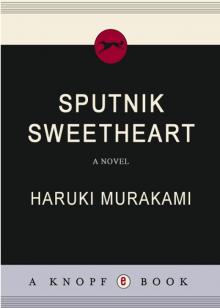 Sputnik Sweetheart
Sputnik Sweetheart Dance Dance Dance
Dance Dance Dance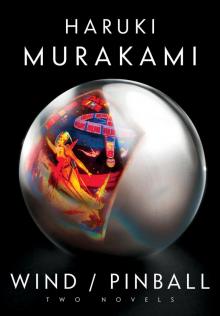 The Wind (1) and Up Bird Chronicle (2)
The Wind (1) and Up Bird Chronicle (2) Blind Willow, Sleeping Woman
Blind Willow, Sleeping Woman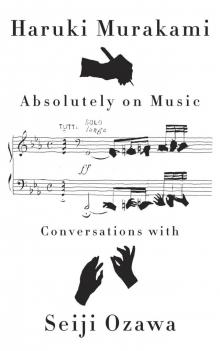 Absolutely on Music: Conversations With Seiji Ozawa
Absolutely on Music: Conversations With Seiji Ozawa Norwegian Wood
Norwegian Wood South of the Border, West of the Sun
South of the Border, West of the Sun Kafka on the Shore
Kafka on the Shore Men Without Women
Men Without Women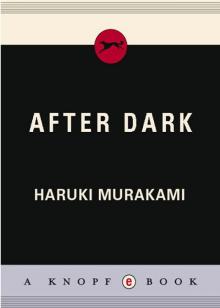 After Dark
After Dark Hard-Boiled Wonderland and the End of the World
Hard-Boiled Wonderland and the End of the World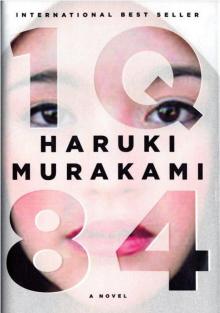 1q84
1q84 The Wind-Up Bird Chronicle
The Wind-Up Bird Chronicle Underground: The Tokyo Gas Attack and the Japanese Psyche
Underground: The Tokyo Gas Attack and the Japanese Psyche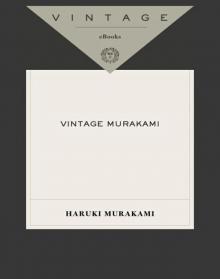 Vintage Murakami
Vintage Murakami The Elephant Vanishes: Stories
The Elephant Vanishes: Stories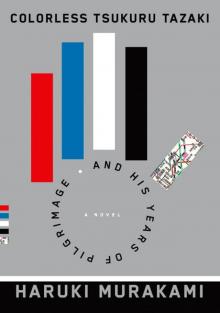 Colorless Tsukuru Tazaki and His Years of Pilgrimage
Colorless Tsukuru Tazaki and His Years of Pilgrimage First Person Singular
First Person Singular After the Quake
After the Quake A Wild Sheep Chase
A Wild Sheep Chase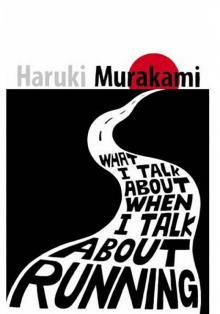 What I Talk About When I Talk About Running
What I Talk About When I Talk About Running Birthday Girl
Birthday Girl The Elephant Vanishes
The Elephant Vanishes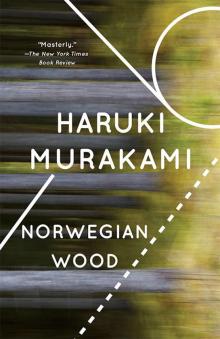 Norwegian Wood (Vintage International)
Norwegian Wood (Vintage International)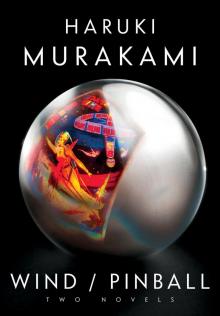 Wind/Pinball
Wind/Pinball Norwegian Wood Vol 1.
Norwegian Wood Vol 1. Underground
Underground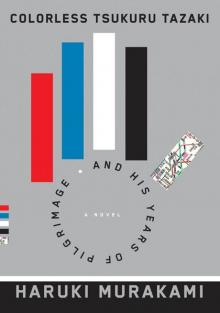 Colorless Tsukuru Tazaki and His Years of Pilgrimage: A novel
Colorless Tsukuru Tazaki and His Years of Pilgrimage: A novel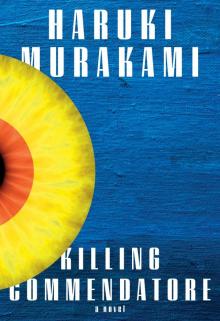 Killing Commendatore
Killing Commendatore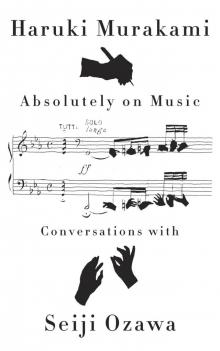 Absolutely on Music
Absolutely on Music